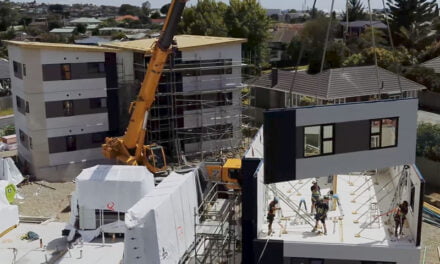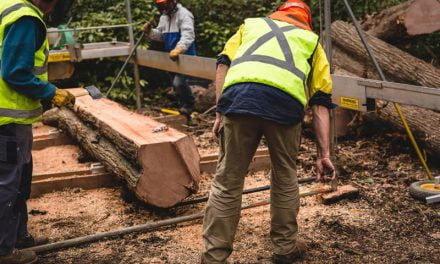With expanded capabilities and range, the merged business is a win for the timber industry.
There has always been more that bound Framequip and Vekta than divided. Yes, the family-run companies were born in cities with practically all of Australia between them – Sydney and Perth respectively – and yes their founders were born a Pacific Ocean apart, but both have an identical history of being driven by a passionate, innovative engineer who is focused on delivering productivity and safety for his customers.
Now, the two companies have become one with their recent merger, which Ed Serrano, CEO of Vekta, announced, saying: “We are delighted to welcome Framequip to the Vekta family.
“Rob Armour and his team have built a proven frame line solution business over the years and their knowledge of manufacturing systems and technology automation offerings will support the growing demands in this sector as we continue to strive to transform the frame and truss industry with leading-edge technology.”
Serrano told TTN, “The Framequip approach is intended to give us a broader toolbox to assist our customers with the appropriate level of automation for their plant.
“Our intention is to take the already solid Framequip product line and use our resources to give it fresh energy. We want to eventually have upgrade options available for both existing and future customers that will enable our customers to grow and expand with the changing markets.”
He added, “We want to be in a position to offer a one-stop shop for plant automation, giving our customers a partner that can help them realise their industrial automation plans. The Framequip line thus fits in nicely with the overall objectives of Vekta.”
Framequip will continue to function under the leadership of Armour, while closely collaborating with Vekta’s sales and operations teams.
“Joining Vekta is a fantastic opportunity for Framequip,” said Armour.
“I am thrilled to contribute to Vekta’s mission to provide and deliver leading automation solutions and services to support the timber frame and truss industry globally. Systems-level disruption will continue to evolve as will Vekta to meet new industry challenges and market forces, while investing continually in research and workforce development programs.
HISTORIES OF SERVICE
Vekta was born when Serrano took a life-changing dive into business. Less than a decade earlier, he had moved to WA from the US as an undergrad student to enrol in Curtin University’s Mechatronic Engineering degree (essentially robotics and other automated systems). Straight out of university he secured a job with PFP Technologies in Perth, and started to build his career.
One of the products he had been hired to work on was the Razer saw. “It was one of the first linear saws introduced,” Serrano says. “And it was one of the few that was built from the ground up specifically for truss and frame, as opposed to designed for another timber-related industry and adapted for the truss and frame industry.”
However, the machine wasn’t profitable. Serrano could see the engineering potential, but it had neither the sales nor support backing it required. When the company decided to mothball the line during the GFC, then 28-year-old Serrano took the idea to his wife, Shelena, and brother and together they bought out the machine and began Vekta. Fourteen years later, it’s an international firm with an ever-expanding line of automated solutions and a solid reputation for working with customers to deliver results that work for their needs.
Framequip began after Armour, who had a history of working in truss and frame machinery and jigs with Stanley Bostitch, struck out independently. In those early days, a box of tools, an old ute, a good head for engineering and a good reputation in the industry was the sum total of his starting assets, but it was enough.
Framequip’s renown and scope both expanded quickly, largely as a result of Armour’s focus on customisation. He says, “People would ring up and say ‘Rob, we like what you’ve got there, but can you make it this way? Or make it do that thing?’ We’d go away and think about it and come up with solutions. So we were able to come back and say ‘Sure, we’ll give it a crack for you!’”
The standard range grew to include nog nailers, auto nailers, waste conveyors, frame lines and more, with a customer base that stretched around Oceania and into the US.
While at first glance, it’s the passion for engineering that ties Armour and Serrano, in terms of how they’ve run their businesses, it’s the passion for delivering best-fit solutions, with both companies having a long history of spending time learning about what their customers do now and want to do with expanded production and then finding ways to help them reach those goals. Accordingly, this is a dream match for the customer base as it brings together the best of both companies in terms of innovation and gives Framequip the benefits of Vekta’s scope.
“There will be new products that stem from the current Framequip equipment,” says Serrano. “And once the onboarding process is complete, we will start looking at enhancements and upgrades – where possible piggy-backing off of technology we’ve developed in other areas – to the existing product lines.”
In addition to the expanded engineering capabilities, the merger of the two companies significantly expands the servicing and support capacity, particularly across Australia, and spreads the load on teams, which is important at a time when fabricators have been pushed to their production limits over the past few years. Both teams have always prioritised service, as they know customer production relies on the least down time possible.
The Framequip branding will be retained through the transition period and Rob Armour’s expertise and library of systems will form part of the Vekta R&D development lifecycle which will deliver future enhancements in high quality machinery to an even bigger sector of the Australian fabrication market.
For more, visit https://vekta.com.au and https://framequip.com.au/
Image: A recent Framequip machinery installation in Victoria; the new company deilvers expanded capability.












